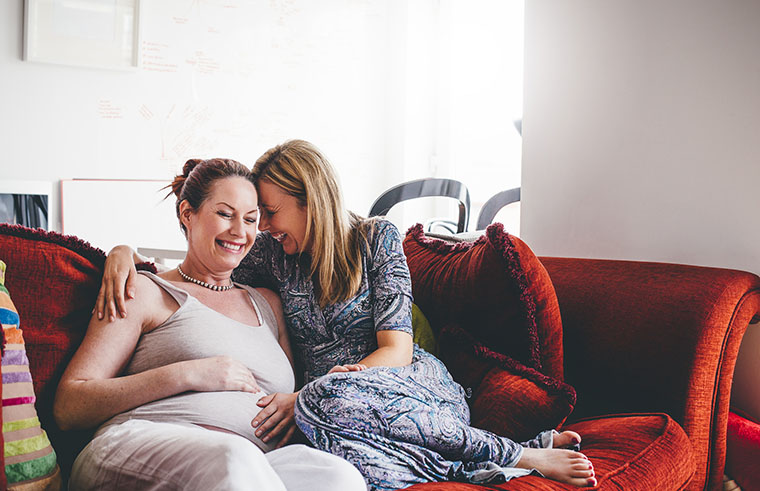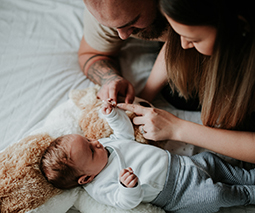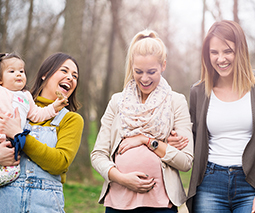Menopause babies – just when you think your baby-making days are done

Once you’ve reached menopause it’s pretty common to assume your baby-making days are over. But don’t put away the birth control just yet! Although it’s rare, some lucky ladies can still fall pregnant at this stage in their lives, and more often than not it comes as a bit of a shock.
What is a menopause baby?
A menopause baby is conceived and delivered by a mother who is technically going through ‘perimenopause’ – the transition period before the ovaries eventually stop releasing eggs (menopause). For most women, perimenopause starts in their 40s, although for some it can be as early as their 30s or later in their 50s, and it usually lasts for a year or two.
During this time the woman will experience irregular periods, hot flashes, vaginal dryness, irritability, trouble sleeping and low sex drive; due to the hormonal changes such as the ovaries producing less oestrogen.
Mature mamas
When women are a bit older and start skipping a few periods, it’s only natural to assume that menopause is knocking on the door. The problem is, irregular periods at a later stage in life are actually quite normal and not necessarily a sign that you’re now completely infertile. So even though the chances of women falling pregnant naturally over the age of 45 are incredibly slim (around 1 percent), it doesn’t mean that it can’t happen – even if you’ve stopped getting your period.
Some women conceive in their 50s and even 60s, with the oldest recorded spontaneous pregnancy being Xinju Tian from Zaozhuang, China who gave birth at the ripe old age of 67 in 2019! It’s widely believed that many female celebrities who are having babies later in life are actually using egg donors, but some have fallen pregnant naturally such as Halle Berry (who admits she was perimenopausal when she conceived her son Maceo at age 47).

How it happens
Many menopause babies come about because a woman has started perimenopause and doesn’t believe it’s now possible to conceive anymore, and therefore doesn’t use contraception. It can also happen when a woman has been unsuccessful in conceiving her whole life and incorrectly believes she is incapable of bearing children.
Technically, a woman has reached menopause once she hasn’t had a period for a year. However, there have also been rare cases where women who have had babies as many as seven years after they believed they went through menopause – incredible!
Why it happens
There is no answer to this magical mystery of the human body, however, there are some theories around what causes this sudden boost of fertility in mature women.
Some say that hormone replacement therapy (which many women use when going through menopause) contributes to this increase in fertility, while others believe it’s your body’s way of having one last shot at doing what nature intended. Whatever the reason, it’s certainly a miracle!
Risks and considerations
While defying the odds and having a baby unexpectedly later in life might be a welcome arrival for many (especially if they have failed to conceive previously), there are a few factors to be aware of. These include:
- Your pre-pregnancy lifestyle – If you’ve gone through menopause and weren’t trying to fall pregnant, you may not realise you’re expecting until you’re quite far along and therefore haven’t looked after your body properly. Drugs, alcohol, smoking and exposure to radiation and chemicals are all factors which are potentially harmful to babies. It’s likely that no prenatal vitamins were taken either, which can help prevent birth defects.
- Older eggs – A woman’s eggs age with her, which means there is increased risk of having foetal abnormalities once fertilised.
- Personal health risks – There are also more health risks for the mother herself, including an increased chance of gestational diabetes and high blood pressure. Post-birth recovery may take longer, and the risk of developing mental heath illnesses such as eating disorders and postnatal depression are also higher due to the dramatic hormonal shifts that come with this life stage.
- Life adjustment – Throwing a surprise baby in the mix when you thought those days were behind you can weigh heavily on a woman and her family. Your career will once again have to take a back seat and if you have children who are a lot older, it can really challenge the family dynamic – new babies do take up a lot of time and attention after all.
- An early caesarean is more likely – Doctors tend to recommend older women deliver via caesarean, as it is believed to be the safer option for both mum and bub. Babies are also more likely to be delivered premature.

The perks
Given so many women struggle to fall pregnant, babies are a huge blessing – even if they’re late to the party! There are plenty of other benefits to having a menopause baby too, such as:
- Mums who give birth later in life may live longer (according to recent studies)
- Older mothers can often be financially more secure, having had more time to focus on their careers
- Emotionally, women may feel more prepared and comfortable about having a baby in their 40s
- Research shows that children born to mums who are older are taller, healthier and more educated
But if you’re not keen …
If the thought of sleepless nights and changing nappies in your 40s or 50s has you quaking in fear, then here’s what you need to do to make sure no little ones decide to make a surprise entrance.
- Be on top of your cycle – Just because you’ve skipped a couple of periods doesn’t mean you’ve gone through ‘the change’ and can forget about your reproductive organs. So make note of how often you’re menstruating so you can work out how long it’s been since your last one, and be aware of your moods and other hormonal changes.
- Use contraception – Until you’re sure you’ve stopped ovulating, you’ll need to keep using contraception. Having your tubes tied or your partner having a vasectomy are the safest bets (although still aren’t 100 percent foolproof); IUDs, the pill, and condoms are just some of the other options available. Chat to your doctor about which is best for you.









